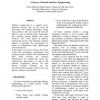KBSE
2008
IEEE
15 years 8 months ago
2008
IEEE
141
click to vote
KBSE
2008
IEEE
15 years 8 months ago
2008
IEEE
—Recent research results have shown more benefits of the management of code clones, rather than detecting and removing them. However, existing management approaches for code clo...
KBSE
2008
IEEE
15 years 8 months ago
2008
IEEE
Software systems increasingly integrate Off-The-Shelf (OTS) components. However, due to the lack of knowledge about the reused OTS components, this integration is fragile and can ...
KBSE
2008
IEEE
15 years 8 months ago
2008
IEEE
The increased popularity of Firm-Hosted Online Communities (FOC) has initiated a radical transformation of customer-producer relationships in many industries with important implic...
119
click to vote
KBSE
2008
IEEE
15 years 8 months ago
2008
IEEE
The software industry is currently experiencing a paradigm shift towards web-based software. We argue that web technologies should evolve in a direction that would allow the devel...
107
click to vote
KBSE
2008
IEEE
15 years 8 months ago
2008
IEEE
In agile software development, test code can considerably contribute to the overall source code size. Being a valuable asset both in terms of verification and documentation, the ...
106
click to vote
KBSE
2008
IEEE
15 years 8 months ago
2008
IEEE
Text-based approaches to the analysis of software evolution are attractive because of the fine-grained, token-level comparisons they can generate. The use of such approaches has, ...
125
click to vote
KBSE
2008
IEEE
15 years 8 months ago
2008
IEEE
Software engineering is a complex sociotechnical activity, due to the need for discussing and sharing knowledge among team members. This has raised the need for effective ways of ...
118
click to vote
KBSE
2008
IEEE
15 years 8 months ago
2008
IEEE
Open-source development, social production, social networks and other factors change the way we understand software systems. The paper motivates the use of social thinking to desi...
117
click to vote
KBSE
2008
IEEE
15 years 8 months ago
2008
IEEE
Evolution of software systems is characterized by inevitable changes of software and increasing software complexity, which in turn may lead to huge maintenance and development cos...



